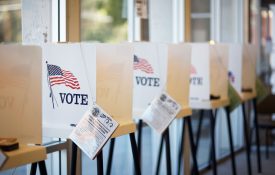-

Using Science to Understand How Ballot Design Impacts Voter Behavior
Concern over the security of the voting process is a recurring issue, but psychological science suggests an even bigger problem may lurk within our voting systems: poor design.
-
Ready, Set, Type! Touch Typists Are Faster, But Not By Much
The first typewriter, invented by a newspaper printer and editor named Christopher Sholes in 1868, had a keyboard arranged like piano keys. Initially, the inventors thought that an alphabetical arrangement of 28 letters in a long row would be the most logical, easiest to use layout. However, after some experimentation, Sholes and his collaborators discovered that this arrangement wasn’t so efficient after all. In 1878, Sholes filed a new patent for the keyboard arrangement that most of us now rely for the bulk of our communications: the QWERTY keyboard. Exactly how Sholes arrived at this arrangement is still a bit of a mystery.
-

Thinking of Loved Ones Lessens Our Need to “Reconnect” Through Anthropomorphism
Reminding people of their close relationships can reduce their tendency to anthropomorphize objects as a way of feeling socially connected.
-
New Research From Psychological Science
Read about the latest research published in Psychological Science: An Embodied Account of Early Executive-Function Development: Prospective Motor Control in Infancy Is Related to Inhibition and Working Memory Janna M. Gottwald, Sheila Achermann, Carin Marciszko, Marcus Lindskog, and Gustaf Gredebäck The authors propose an embodied perspective to early executive-functioning development, suggesting that executive-functioning skills are grounded in infant's ability to control and plan motor actions.
-
Too Sweet, Or Too Shrill? The Double Bind For Women
NPR: Fewer than 1 in 5 members of Congress are women. At Fortune 500 companies, fewer than 1 in 20 CEOs are women. And if you look at all the presidents of the United States through Barack Obama, what are the odds of having 44 presidents who are all men? If men and women had an equal shot at the White House, the odds of this happening just by chance are about 1 in 18 trillion. What explains the dearth of women in top leadership positions? Is it bias, a lack of role models, the old boy's club? Sure. But it goes even deeper. Research suggests American women are trapped in a paradox that is deeply embedded in our culture. Read the whole story: NPR
-
The Fake Laugh
The New York Times: Eavesdrop on any conversation or pay close attention to your own and you’ll hear laughter. From explosive bursts to muffled snorts, some form of laughter punctuates almost all verbal communication. Electronic communication, too, LOL. You’ll probably also notice that, more often than not, the laughter is in response to something that wasn’t very funny — or wasn’t funny at all. Observational studies suggest this is the case 80 percent to 90 percent of the time. Take Hillary Clinton’s strategic laughter during heated exchanges with Donald J. Trump during the presidential debates.

